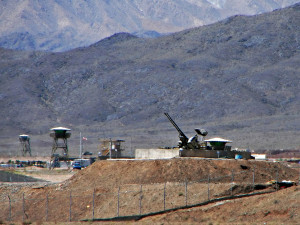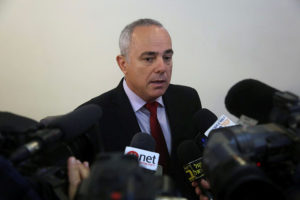Israeli officials visited Paris Sunday to encourage France to take a hard line in the emerging bad deal with Iran as the deadline for the nuclear negotiations nears.
Israeli Intelligence Minister Yuval Steinitz flew to Paris over the weekend with National Security Advisor Yossi Cohen to encourage the P5+1 to toughen their stance in nuclear negotiations with Iran. Thus far, France appears to be the most demanding party to the negotiations. Israel has repeatedly expressed concern that the deal under discussion does not go far enough to prevent Iran from acquiring a nuclear weapon.
Steinitz is “on a mission from Prime Minister [Benjamin Netanyahu] for a short visit to Europe in an attempt to influence the details of the emerging agreement on the Iran nuclear issue,” said his spokesman, Eyal Basson, in a statement. The minister told Israel Radio ahead of his visit, “This is an effort to prevent a deal that is bad and full of loopholes, or at least…to succeed in closing or amending some of these loopholes.”
Despite having the most to lose from a nuclear Iran, Israel is not a part of the ongoing negotiations. In his speech to the US Congress, Netanyahu expressed concerns that, based on leaked details, the agreement currently being drafted leaves too much of Iran’s nuclear infrastructure intact, expires too quickly and fails to address Iran’s role in promoting instability in the Middle East.


Natanz nuclear facility guarded by anti-aircraft guns. (Wikimedia)
France is similarly concerned that the agreement is too soft on Iran. Foreign Minister Laurent Fabius even phoned his country’s negotiating team last week to instruct them not to make any more concessions. “France wants an agreement, but a robust one that really guarantees that Iran can have access to civilian nuclear power, but not the atomic bomb,” he told Europe 1 radio.
French diplomats have criticized the US for holding to the March 31 deadline to reach a deal. “Making the end of March an absolute deadline is counterproductive and dangerous,” French Ambassador to the US Gerard Araud said via Twitter. France is particularly worried that the agreement lifts sanctions, especially UN sanctions, too quickly and that it does not go far enough to ensure Iran’s compliance with restrictions on nuclear research. Officials involved in the negotiations state that France is seeking a 25-year agreement, while a 15-year deal is more likely.
Both the US and the EU have reduced their information sharing with Israel on the nuclear negotiations after Israel publicly expressed alarm at the extent of the concessions being made to Iran.


